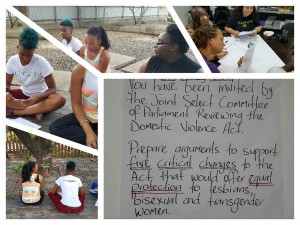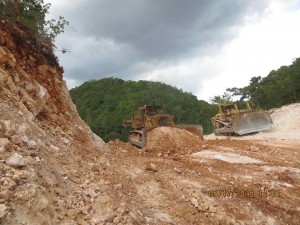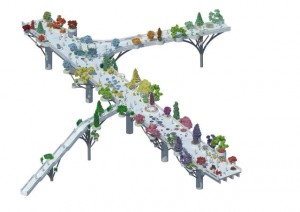
Dissecting Development: What Does It Mean for Jamaica?
May 27th, 2015
I have had an interesting Labour Day weekend. A series of wide-ranging conversations has set me thinking, so forgive me if I do a little philosophizing this week. It all began with this question: “What does development mean to Jamaicans?” If we threw this word out to the average Jamaican, what would first come to mind?
Development is progress, right? It is moving forward. The People’s National Party loved that word “progress” – don’t stop it! – but then, perhaps it wasn’t all that we expected it to be.
The word came up in several different contexts over the weekend. During a learning session on the Domestic Violence Act with a group from WE-Change, the issue arose in relation to human rights. WE-Change, by the way, is a recently launched affiliate of J-FLAG that describes itself as “a rights-based, women-led, community-based advocacy group committed to increasing the participation of lesbians, bisexual and transgender [LBT] women in social justice advocacy in Jamaica and the Caribbean.” From our discussions, it became clear that development means moving towards a more inclusive society, in which all Jamaicans (each and every one, as individuals) are recognized for who they are, whatever their identity.

Saturday session with WE-Change. Development must include respect for human rights! (Photo: WE-Change)
One of WE-Change’s guiding principles is from the 1995 Beijing Declaration, as follows: “Women’s participation in all spheres of society, including participation in the decision-making process, and access to power, are fundamental for the achievement of equality, development, and peace.” Surely the equal participation of all citizens must be an essential ingredient for development. Has Jamaica accomplished this? I would say we are far from it. What is needed is the acknowledgement, recognition and integration of marginalized groups (not only the LGBT community; there are many others who for various reasons are sidelined, disregarded in our society). They are all Jamaicans! This will likely have to happen bit by bit. Let’s listen to what our seniors (whom I like to call the “elders”) have to say, for example, with their wealth of experience and knowledge; why not get them involved in building our society? (No! I am not talking about our rapidly greying politicians (on both sides of the fence) who have passed their expiry date and need to quietly retire!) Our at-risk youth should be closely involved in the process, too.
So development has a lot to do with the empowerment of our citizens – every one, because human rights are universal. It has a “people” dimension that our leaders often overlook.“We all want to live our lives the way we want to, in comfort, feeling safe and secure,” someone said. Once we have reached that stage in our lives – that’s development, on the personal level.

Roads are being cut on the edge of Cockpit Country, leading to mining operations. (Photo: Windsor Resource Centre)
During a chat with friends yesterday, we started talking development. The issue was the apparent encroachment by a mining company (Noranda) inside a boundary designated by stakeholders’ groups in Cockpit Country – the sudden appearance of bulldozers on the horizon. This is a complex issue, with several boundaries set by different groups, and it has to be untangled somehow. But the question came up: Is this really development? The scraping up of vast quantities of rich topsoil; the ripping and tearing of hillsides; the demolition of forests and farmland; the eviction of everything and everyone that lives on them? A destruction, leaving a scar that never fades from our landscape or our lives? If development is about moving forward, is this a step in the right direction, or is it simply short term grabbing of an economic opportunity?

A major overhead highway that has become unsafe for heavy traffic is to be transformed into a “green garden” pedestrian path in Seoul, Korea, that will cut down on the amount of traffic going into the city center. “Good” development should enhance the quality of citizens’ lives.
Surely development must be ongoing, a long term concept. It’s about growing, and it’s supposed to be a good thing. The much-maligned “environmentalists” (many of whom are scientists, experts in the field) are nevertheless seen as “anti-development.” These scientists are seen as illogical, stubborn, unpatriotic, selfish even. How could anyone who loves this country be against development? And yet, supposing the despised environmentalists are actually for development? They are looking for a different kind of development – that “fleeting illusion” (stealing a phrase from the Opposition Leader) of calm, balance, stability, where each element of society interlocks smoothly with the other. A jigsaw puzzle that creates a beautiful picture. An ideal, perhaps.
A Twitter friend shared his concept of “development” – and I like it: “The ability to set and achieve realistic goals for the welfare of man and his environment to create social and economic harmony.” Yes – that harmony, that elusive balance. Not the fake “balance” that politicians pretend they can achieve, but actually end up tipping the scales in the direction of quick, easy takes; but something almost spiritual, something that is found much deeper – a connection that works for all citizens.
Does any of this make sense? Well, perhaps it would help for us all to do a little kundalini yoga. Let’s meditate on it, for a while.
Tags: bauxite mining, Beijing Declaration, Cockpit Country, Domestic Violence Act, Energy and Mining, environmentalists, human rights, Jamaica, LGBT community, Noranda, People's National Party, senior citizens, WE-Change, women's rights, youth at risk
The Gleaner reserves the right not to publish comments that may be deemed libelous, derogatory or indecent.
To respond to The Gleaner please use the feedback form.
2 Responses to “Dissecting Development: What Does It Mean for Jamaica?”
- We Are the Zoomers
- Living Online with Humans and Birds: NAOC 2020
- Human Trafficking and the Problem of Public Education
- Down Memory Lane
- Are We Ready to Recover from COVID-19?
- Road Safety Matters: Is Your Vehicle Safe?
- Sexual Harassment, Me Too, and the Minister’s Disturbing Giggle
- The Vulnerable Senior Citizens, Private Care Homes and COVID-19
- A Muddle Over Masks
- Here is Something Life-Saving You Can Do: Give Blood!



Very well said Emma, there is so much to do, Jamaica is not developping, it is selling, most people and enterprises disregard laws, we must change and think, think for the common good, including the laws for the good of the environment,
the laws are here to be applied and not to stay in the book to be omitted, we must change and make things work much better.
Thanks for your comments, Annemarie. I could not agree with you more. There are indeed some pretty good laws that are either ignored, or bypassed. In the case of Cockpit Country, Noranda Bauxite (which is 51% owned by the Government) has a “special exclusive license” to mine in the area adjoining (and, stakeholders claim) encroaching on the boundaries, and it seems from all I can gather to be able to do what it wants. Likewise, thanks to various Memoranda of Understanding, deals that have been struck with overseas entities such as the China Harbour Engineering Company (owned by the Chinese Government) and others seem to have overridden the usual checks and balances and the details are kept secret. This is the democracy we live in!